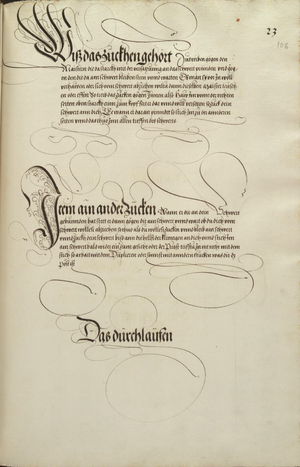|
|
You are not currently logged in. Are you accessing the unsecure (http) portal? Click here to switch to the secure portal. |
User:Kendra Brown/Latin Lew/94r
< User:Kendra Brown | Latin Lew
Jump to navigation
Jump to search
Revision as of 20:37, 19 January 2021 by Kendra Brown (talk | contribs)
Munich 94r / PDF page 33
Contents
Absent Zettel verse
German from Dresden 106r (PDF page 23)
- Das Zuckhen
- Trit nachent Inn punnden
- das zucken gibt gut funnden
- Zuckh trifft er zuckh mee
- er befindet arbait die Im thuot wee
- vnnd zuck alle triffen
- den Maistern wiltu sy effen
English ver 1 (Garber?)
- The Pulling
- Step near in binding
- the pulling gives good finding
- Pull hit before; pull more
- he finds work who does him injury
- and pull all hits
- to the Masters if you want to deceive them
English ver 2 (Fritz?)
- Step closer in the bind.
- Zucken (jerking) gives good findings.
- Jerk, if he hits, jerk again.
- Find work that hurts him.
- Jerk in every encounter
- if you want to mock the masters.
33 a
33 a Latin (Sandbox)
- RETRACTIO ENSIS
- HIC modus contra Athleticae magistros exercendus est,
- qui fortes in coruscatione collisioneque ensium addita simul defensione.
- Itemque adversus eos,
- qui ab ensium coniunctione non recedunt expectantes,
- num adversarij longius ictum regere velint,
- vel ensem removere,
- Si igitur eos magistros decipere cupias,
- retractione ensis hoc modo utȇris:
- ex latere dextro acriter versum adversarij caput ferias,
- et si is impetum eum removere conetur,
- ensem retrahas priusquam ipse eum contigerit,
- inde autem latus ipsius alterum pungito,
- atque hoc habitu in singulis contactibus[^1] utitor.
94r a English (Sandbox)
- drawing back the swords
- This manner should be practiced against teachers of Athletics,
- [and] any kind of stronger ones, in the flashing and clashing of swords, a defense having been added at the same time,
- And besides against those,
- who don't hold back in expectation about the conjunction of swords,
- [depending on] whether they [the people listed above] wish to direct the longer strike of the adversary,
- or set the sword aside,
- If, therefore, you wish to deceive those teachers,
- you use the sword in this manner by drawing back:
- you should strike from the right side fiercely against the head of the adversary,
- and if HE attempts to shift the forward attack,
- you draw the sword back until it [the sword] contacts him,
- thence moreover prick the other side,
- and use this gesture according to each contact at a time.
94r a notes
- [^1]: this is plural, but all the english idioms that we think capture the meaning don't work in plural.
94r b
94r b Latin
- ALIUS PRECEDENTIS HABITUS
- si ensem tuum adversarius contigerit.
- SI igitur hostis haereat in ensium collisione expectans,
- non removere ensem velis,
- retractionem ensis tu simulato,
- nihilominus tamen inhereas,
- Verum celerrimé ense retracto ad medium usque,
- subito iuxta gladium ipsius visum vel pectus pungito,
- Sin autem hostem non veré punxeris,
- tunc utitor duplationibus,
- vel quicquid tibi optimum factu visum fuerit exerceto.
94r b English
- Another of the preceding gesture?
- If the adversary touches/contacts your sword.
- If, therefore, the adversary hesitates, expecting in the collision of swords,
- that you will not wish to shift your sword,
- YOU shall simulate withdrawing of the sword,
- nevertheless you (should) linger just as much,
- Truly, the sword having been withdrawn most quickly all the way to the middle,
- suddenly prick his face or chest near the sword,
- If, however, you have not truly pricked[^2] the enemy,
- then use doublings,
- or employ whatever seemed best to you while doing it.
94r b notes
- [^2]: If we assume that the author thought pungo was 3rd conjugation instead of 2nd, then it's subjunctive perfect. Otherwise, it's passive. Which makes no sense.
- parallel construction, two targets, present in german

